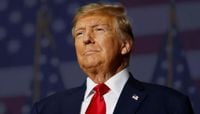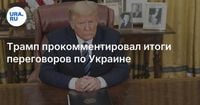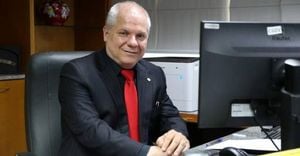On April 23, 2025, significant negotiations took place in London involving Ukrainian, American, and European delegations, aimed at finding a peaceful resolution to the ongoing conflict between Russia and Ukraine. However, the status of this meeting was notably diminished as the head of the U.S. State Department, Marco Rubio, did not attend. This absence raised eyebrows, especially given the critical nature of the discussions at hand.
In the lead-up to the meeting, Western media had reported on a controversial American "peace plan" that proposes recognizing Russia's annexation of Crimea and freezing the current front lines. These details, sourced from various outlets, have stirred considerable debate about the implications for Ukraine's sovereignty.
According to U.S. officials, the meeting would proceed without Rubio, and instead, the American delegation was led by President Donald Trump's special envoy, Keith Kellogg. He met with representatives from Great Britain, France, and Germany, while Ukraine was represented by Foreign Minister Andriy Sybiga, Defense Minister Rustem Umerov, and the head of the President's Office, Andriy Yermak.
Following the meeting, Yermak expressed optimism, stating, "This is already the second meeting — the previous one took place in Paris. Today we continued a deep dialogue aimed at achieving a just and lasting peace in Ukraine. We are committed to the peace efforts of U.S. President Donald Trump." He further noted, "We are grateful to our partners for their unwavering support and joint desire to end the war as soon as possible. Russia continues to refuse a meaningful ceasefire, delaying the process and trying to manipulate negotiations." Additionally, he mentioned the need for regular consultations to achieve a just peace for Ukraine.
Meanwhile, President Volodymyr Zelensky held a press conference where he was asked about the numerous reports regarding the American peace plan. He addressed the issue head-on, stating, "As soon as we start talking about Crimea, about our sovereign territories and so on, we enter the format that Russia wants, into the dragging out of the war. Because it will not work quickly to agree on everything. That is, we cannot discuss Crimea." Zelensky firmly reiterated that Ukraine does not recognize the legal occupation of Crimea, emphasizing, "This is our territory, the territory of the people of Ukraine." He insisted that discussions should focus solely on achieving a permanent ceasefire without territorial concessions.
American officials, however, have indicated that they believe a swift agreement is necessary to end the conflict. If no agreement is reached soon, Washington is prepared to withdraw from the negotiation process, a threat echoed by both President Trump and Secretary of State. Reports suggest that the U.S. was looking to secure Ukraine's consent to their plan during the London meeting, with plans for Whitcoff to travel to Russia afterward.
Trump had previously stated that a peace deal between Ukraine and Russia could be finalized within the week, and the Kremlin has confirmed its anticipation of Whitcoff's visit.
As the discussions unfolded, the British newspaper Daily Telegraph reported that the American peace plan consists of seven key points, which include formal recognition of the Russian annexation of Crimea, Ukraine's renunciation of NATO membership, and the complete lifting of American sanctions against Russia. The specifics of the plan are as follows:
- Immediate truce.
- Initiation of direct negotiations between Ukraine and Russia.
- Ukraine's refusal to join NATO, while maintaining the possibility of joining the European Union.
- De jure recognition of the Russian annexation of Crimea, with a freeze on the front lines.
- Ukraine signing an agreement with the U.S. for joint mineral extraction.
- Establishment of new economic ties between the U.S. and Russia, including lifting sanctions and cooperation in energy.
However, the plan does not provide clear security guarantees for Ukraine, nor does it address some of Moscow's demands, such as limiting the size of the Ukrainian army or halting Western military assistance to Kyiv. This has raised concerns among Ukrainian officials and their European allies, who doubt the viability of the proposed agreement.
In a related development, the Financial Times reported that President Putin had suggested abandoning claims to four regions of Ukraine currently under partial Russian control during a recent meeting with Whitcoff in St. Petersburg. Meanwhile, Axios has indicated that the Biden administration is awaiting Ukraine's response to the peace plan.
U.S. Vice President Jay De Vance confirmed during a visit to India that Washington had made "very open proposals" to both Russia and Ukraine, asserting that both parties must agree, or the U.S. would withdraw from the negotiation process. He noted, "Lower lines, or something close to them, — this is what, as it seems to me, new conflict lines should be proposed," suggesting that both sides would need to make territorial concessions.
Despite the pressure for a rapid resolution, sources within Ukraine have expressed skepticism about the likelihood of achieving a peace agreement. Officials from the British Foreign Ministry also indicated that they did not expect any agreements to emerge from the London talks, viewing the meeting more as an opportunity for Ukraine to articulate its vision for a future peace deal.
The urgency surrounding these negotiations has raised questions about the potential consequences for Europe and the broader geopolitical landscape. As the conflict drags on, the implications of any agreement—or lack thereof—could reshape the dynamics of international relations in the region.
As the situation develops, the stakes remain high for all parties involved. The next steps in the negotiation process will be critical, not only for Ukraine and Russia but also for the role of the United States and its allies in shaping the future of European security.





